Dentures, also known as false teeth, are prosthetic devices that are used to replace missing teeth. They are removable and can be made to look just like your natural teeth.
Here, we’ll further explore what are dentures, when they’re suitable, their cost, procedure, recovery, maintenance, and alternatives, among other things.
What Is A Denture
Dental dentures are artificial teeth that replace those lost to decay, injury, or disease. It can allow a person to talk, eat, and smile comfortably again.
Most commonly, acrylic dentures are used, it also contains metal for more durability. Sometimes, this metal is hidden in the plastic, so it is not always visible.
Types of Dentures
In general, there are three types of dentures:
Full Dentures
When all teeth are missing in the upper or lower jaw, complete dentures are worn. Saliva helps hold them in place.
However, if you have a dry mouth (a common problem in older people), denture adhesives can help.
Partial Dentures
When a person’s missing a few or more teeth, the dentist recommends the use of partial dentures (lower or upper partial dentures).
They prevent the shifting of the teeth into the empty space so that they don’t get crooked and affect the overall bite.
The gummy plastic bases are attached by metal, and it’s firmly anchored in place with the help of clasps that are attached to the natural teeth.
However, there are also fixed dentures that are held in place by implants.
These are considered permanent dentures. However, their removable, snap-in options are also available.
You can have a lower part denture or an upper denture of this nature.
Single Tooth Dentures
A one-tooth denture replaces a single missing tooth.
It also has a pink base with clasps (metal or acrylic resin) to attach to the teeth on either side of the space.
Moreover, it can be one front tooth denture or one back tooth denture.
A denture for a single tooth (or partial teeth) with a metal framework is also known as a chrome denture. Cobalt chrome dentures are popular in this regard.
Snap-On Dentures
Snap-on dentures are types of implant-supported dentures that can be removed from the mouth. Essentially, they are dentures that clip in the implants so they remain anchored in place.
Unlike removable dentures, these offer more stability.
However, because they require implants to be held in place, they can be quite expensive.
Flexible Dentures
Made from plastic, flexible dentures don’t come with any metal clasps.
These are usually made from biocompatible nylon and can be quite soft and comfortable to wear.
However, the problem is that flexible dentures are typically partials. So, they’re not suitable if you require full mouth restoration.
Flexible dentures are also more difficult to adjust, and they’re not as durable either.
Additionally, they can cost more than metal-based dentures.
Palateless Dentures
Palateless or roofless dentures don’t have a plastic or metal framework covering the palate of the mouth (they can still have a metal base underneath false teeth).
For that reason, they can be more comfortable to wear, especially if your gag reflex is very sensitive.
With these dentures, stability can be an issue if they’re not supported by implants.
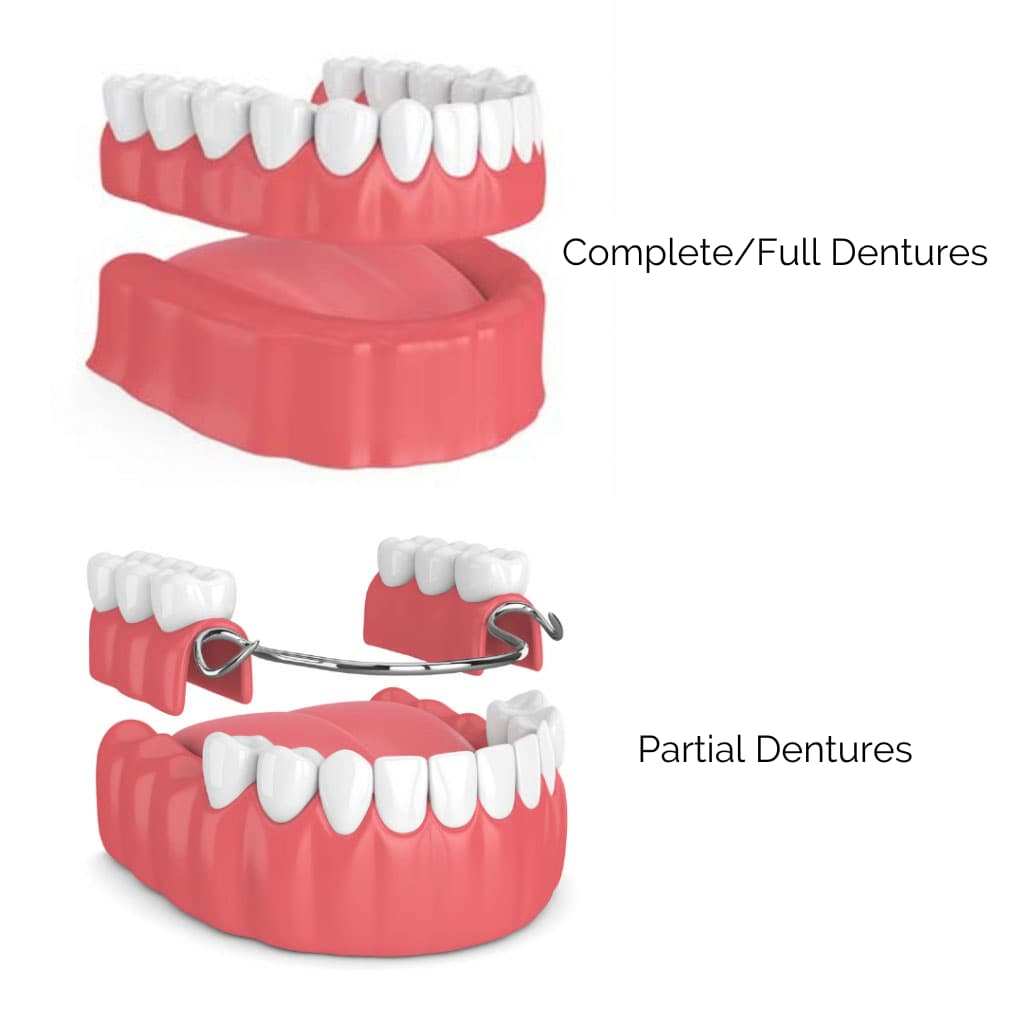
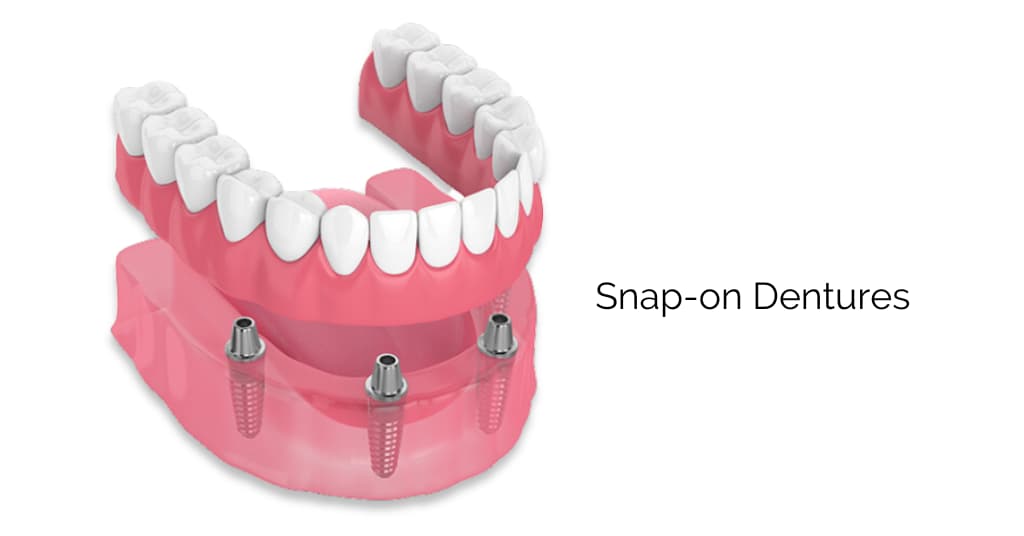
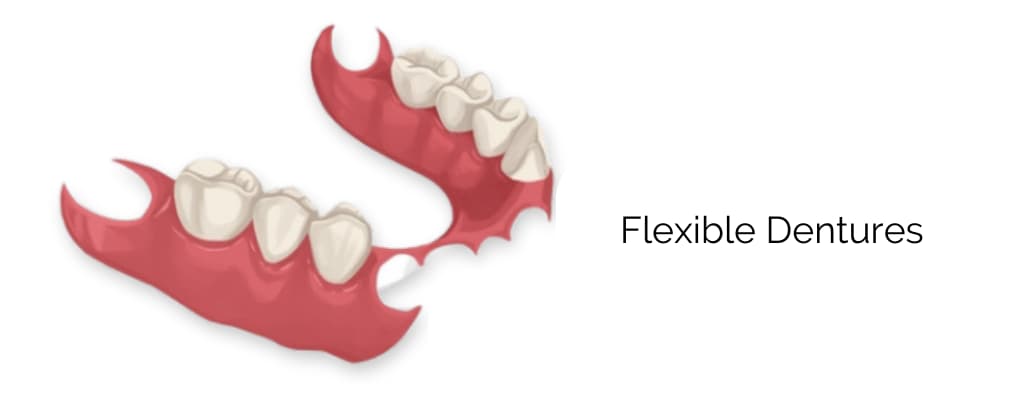
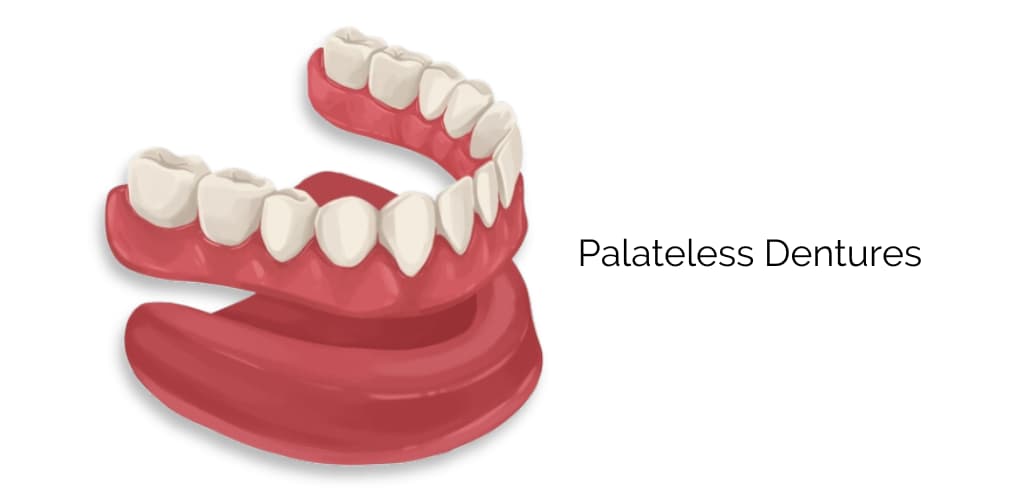
Cost Of Dentures
Typically, dentures’ cost is influenced by their material and coverage (full or partial, upper or lower).
They also vary based on their type. Of course, a single-tooth denture cost will be lower than a partial denture cost.
Between fixed dentures cost and snap-in dentures cost, usually the number of implants is the deciding factor.
Keep in mind that the cost of dentures can also include the placement of implants. And before that, you might need to have teeth extracted or your jawbone grafted.
Additionally, when calculating the cost for dentures, you need to account for initial consultation, X-ray, medication, and follow-up.
Depending on where the clinic is located and how experienced your dentist is, dentures prices can be quite high, especially if you’re getting them privately.
Dentures Cost In The UK
Dentures are a band 3 treatment on the NHS, which costs £306.80. While NHS dentures are quite cheap, long waiting lists turn many patients to private practices.
Compared to dentures on NHS, private dentures cost in the UK can be 2-10 times higher.
If you’re wondering how much are dentures in the UK, here are their estimated dentures costs in the UK:
- Single-Tooth Dentures Cost UK – £250
- Partial Dentures Cost UK – £300-£1,000
- Full Dentures Cost UK – £500-£2,000
- Flexible Dentures Cost UK – £500-£1,000
- Snap-On Dentures UK Cost – £4,000-£10,000
Best dentures in the UK also cost different from the ones made from cheaper materials. Here’s a cost breakdown of dentures in the UK based on their materials:
- Acrylic Denture Cost – £250-£2,000
- Metal Denture Cost – £500-£1,500
- Plastic Denture Cost – £500-£1,000
Dentures Turkey Cost
Dentures in Turkey cost 3-5 times less than in the UK.
It’s mainly because of the Turkish economy and the cost of living. This industry is also quite competitive, so patients can get even better costs of dentures in Turkey.
Here’s a cost breakdown based on the type and material used:
- Temporary Acrylic Denture – £400
- Full Acrylic Denture – £400
- Implant Supported Denture – £500
- Hybrid Porcelain Denture – £2400
Cosmetic Dentures in Turkey: Turkey Treatment Costs and Time Period
The cost of dentures in Turkey can be anywhere from £400 to £2,500. However, if you require additional procedures like extraction or grafting, it will cost extra.
Still, dental treatments in Turkey are much more affordable. The same best dentures on the market in the UK will cost you way more.
Keep in mind that patients are offered accommodation in hotels, private transfers, medications and aftercare as a part of their treatment plan. You even have the option to pay flexibly for your treatment.
Taking all these things into consideration, you can get very affordable dentures in Turkey.
And as far as the duration of your stay is concerned, it’s usually around 10 days. Around 3 appointments are required for getting dentures.
Am I Suitable For Dentures?
Who Is Suitable For Dentures?
These are most suitable for those who want to restore the normal functioning of their mouth.
Loss of teeth not only affects the confidence of an individual, making them feel self-conscious, but it can also cause difficulties in speech and eating.
The loss of teeth can also give the face a sunken appearance, so cosmetic dentures can fix that problem as well.
What To Think About Before You Have Dentures?
Before getting dentures in Turkey, there are a few things that you need to know.
First and foremost, you should ask about the specialisation, licensing, and experience of the dentist.
In addition, you should know if they have liability insurance. The clinic also needs to have registration with the Ministry of Health.
Afterwards, you should ask about the false teeth. Questions like the following are important in making the right decision:
- How many appointments are needed?
- How do I take care of my false teeth dentures?
- How long will the dental dentures last?
- What to expect before and after dentures?
- Is there a permanent alternative to temporary dentures?
It’s also a good idea to take a look at the dentures before and after images of patients who had this treatment.
How Best To Prepare For Dentures?
There are a few things that need to be in order. Most importantly, your gum tissue needs to be in good health. If you have an infection, you need to get it treated first.
On the day of the procedure itself, you should make sure that your mouth is clean. Using a soft-bristled brush, clean the palate, tongue, gums, and the remaining teeth (if any).
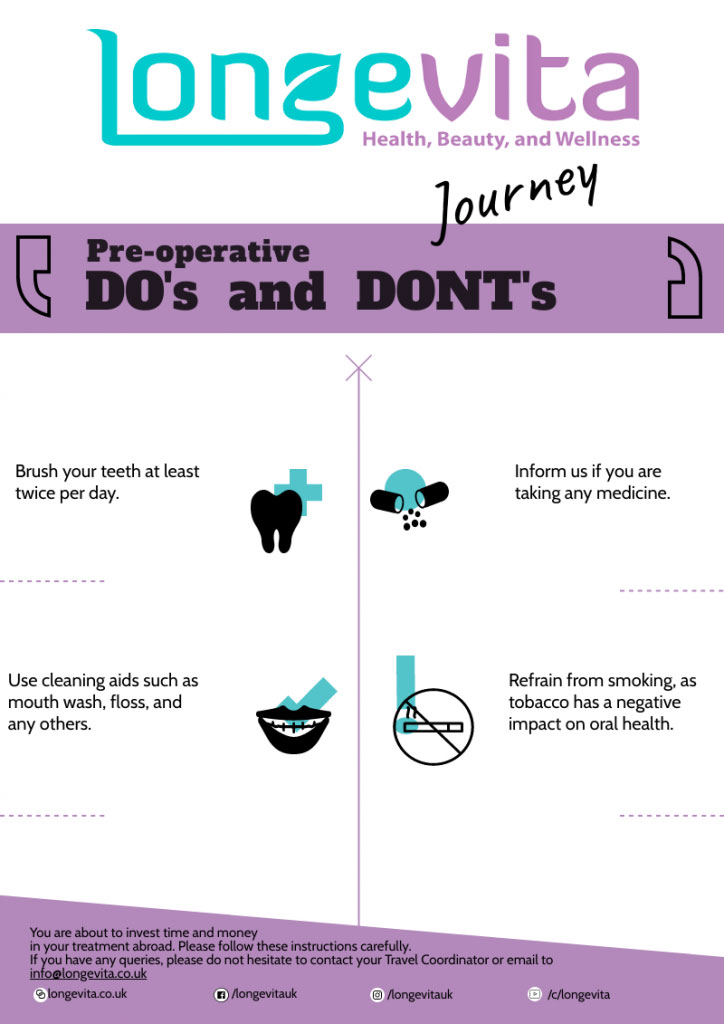
What Is The Procedure For Getting Dentures?
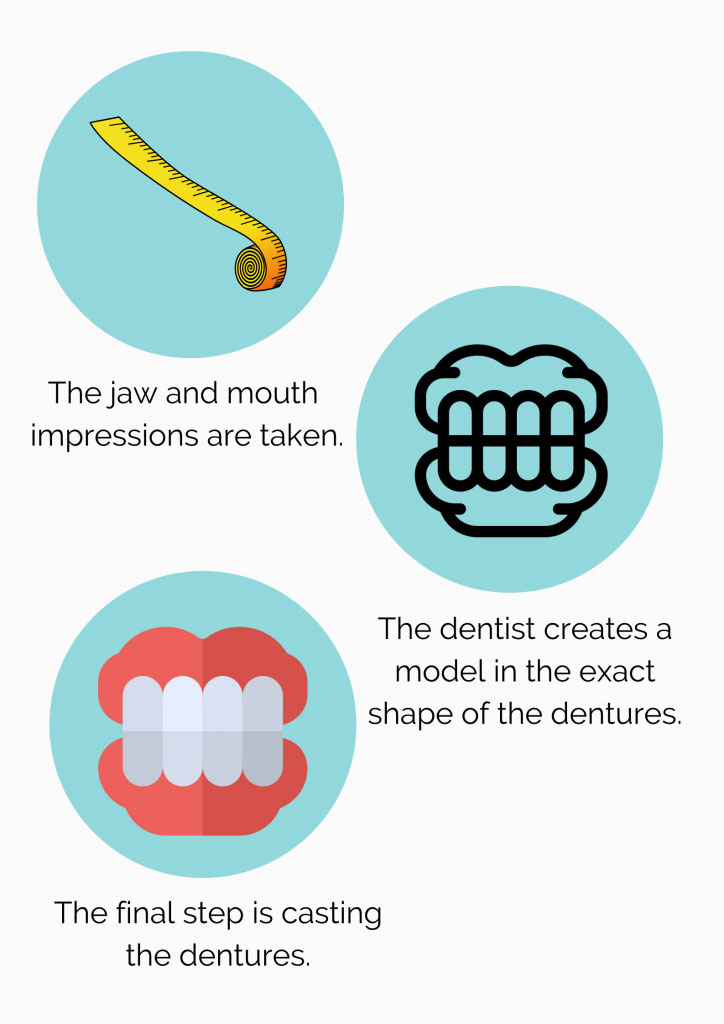
This treatment involves more than a few appointments. First, the dentist will assess the condition of your gums. You may also need an X-ray.
Through this, they’ll determine if your mouth will be able to hold the false teeth in place. If you have a few teeth remaining that cannot be saved, the dentist may extract them all so you can get a full denture.
No matter the kind of false teeth you’re getting, the dentist will begin by measuring the space between your jaws and how they lie together. Following that, their impression is taken using dental putty.
Based on the measurements and impression, a dental technician will prepare a model first. You’ll wear it to check if it fits or needs any further changes.
After you have agreed on the fit and colour, the final teeth dentures will be made. There are two different types of dentures that you can get:
Immediate Dentures
The dentist will have taken the measurements of your mouth and the impression of your jaw before the extractions.
Therefore, you’ll have a temporary denture to wear soon after the tooth extraction, as your gum tissue is healing.
In this case, though, you need to keep in mind that the gums and bones will shrink during the healing process.
So, either the base of the denture is remade in a process called relining (to reline the denture, new material is added to its base) or the whole denture is remade.
In any case, further appointments will be needed to make adjustments.
Conventional Dentures
These are made 2-3 months after the dentist has extracted your teeth, giving the gum tissue enough time to heal and reshape. These dentures fit well the first time.
Book A Free Consultation With Our Patient Consultants
We offer free consultations for patients across the UK & Ireland, so you can discuss your individual requirements with our specialists. Book A Free Consultation With Our Patient Consultants Today.
Recovery & Results Of Dentures
After the fitting of the final denture, your dentist may advise you to wear it as much as you can, even when sleeping.
This is so that you can get used to having the denture in your mouth, as it may be uncomfortable at the beginning.
However, afterwards, you’ll be advised against wearing them when you’re sleeping so that your gums can relax and don’t get infected.
How long do dentures last?
The longevity of the dentures can depend on the material from which they’re made and how well you take care of them.
Usually, they last anywhere between 5-8 years, after which you’ll need to get them replaced.
During this time, your dental prostheses may need adjustment because the bone and the gum tissue will shrink (due to the lack of stimulation provided by just the denture teeth).
You should make sure to have your dentist check your false teeth during your regular checkups or even earlier if needed.
How to Take Care of Your Dentures?
Dentures enable teeth to look natural however, they won’t know if the food’s too hot or cold. So, make sure to check your food’s temperature beforehand.
Additionally, dentures cannot “sense” hard foods like bones, so be careful as it can cause damage.
Other than that, they need moisture to retain shape. When in your mouth, your saliva provides that.
However, when you’re not wearing them, make sure to store them in a special denture solution (as advised by your dentist) or water.
While taking care of your false teeth, you should not forget about your oral health. You still have to brush twice a day for at least 2 minutes because the gums gather plaque and bacteria.
When brushing, make sure that you get the roof, tongue and gums. In the case of partial denture teeth, you need to get the area under the clasps so that you don’t risk tooth decay.
Lastly, make sure to avoid highly sugary, sticky foods.
How to Clean Dentures?
For this, make sure to do the following:
- Stand over a bowl of water or a counter with a towel spread out when beginning cleaning; they can break if you drop them.
- Use warm water (not hot as it can warp the plastic) and a soft-bristled brush to get all the crevices. It should also be enough to remove any stains on its surface.
- Do not use toothpaste to clean the denture as it is too abrasive. It can scratch the surface, creating pockets for the entrapment of food and bacteria. According to the American College of Prosthodontics, dentures should not be put in sodium hypochlorite for more than 10 minutes. A hand soap should be enough to clean the denture.
- Ideally, wash it after every meal and “clean” it twice a day, every day.
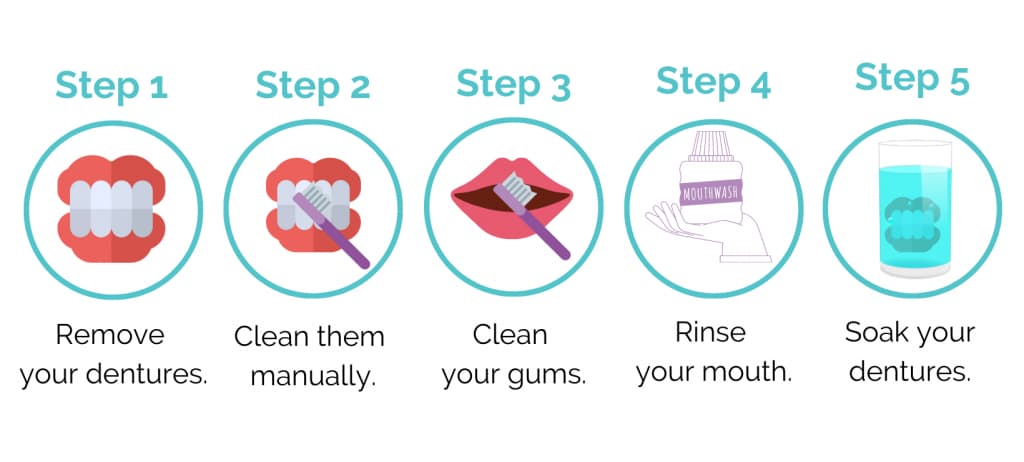
Side Effects to Expect After Getting Dentures
When wearing flexible dentures, you can expect a few side effects, at least temporarily. Commonly, people experience soreness and irritation.
In addition, your salivary glands will increase the production of saliva until they get used to the presence of these denture teeth.
Some people also experience difficulty in eating and pronouncing some words with these appliances.
What Could Go Wrong After Getting Dentures?
Dentures should not cause many problems on their own. However, a poor fit can cause irritation and result in the formation of canker sores in the mouth.
In addition, if they aren’t cleaned properly, they can cause infection, tooth decay, and bad breath.
What To Do If You Have Problems After Getting Dentures?
If you are experiencing a problem with the dentures regarding their wear, you need to get in touch with the Aftercare team.
After you communicate your issues, they’ll get an assessment from your dentist. You can also use the Support Portal to open a ticket.
Alternatives to Dentures
Dental implants offer a permanent alternative to removable dentures.
These implant-retained teeth are screwed into the metal posts that are fixed into the jawbone (preventing its degradation).
Following are the differences between the two treatments:
| Dentures | Implants | |
| Procedure | Mould impression used to create a plastic model of palate and teeth | Metal posts fixed into the jawbone for the placement of artificial teeth on top |
| Placement | Removable | Permanent (can be taken out by the dentist only) |
| Maintenance | Frequent dental appointments for adjusting the fit | Fewer visits since the implants help in the retention of the bone structure |
| Stability/Comfort | Less likely to stay in place and can slip when talking, eating, coughing, or laughing | Remains stable since it is fixed in place. More comfortable to wear. |
| Cost | Less expensive | More expensive |
FAQ
Why am I having problems with bottom teeth dentures, even though the top ones are fine?
Unlike the suction (from the palate) that holds the top denture in place, bottom dentures don’t have that support. This can make the fit of the bottom half more problematic.
How long does it take to get used to dentures?
It can take a few weeks to 1 month for you to get used to wearing false teeth. To be able to do that, you’re recommended to wear them at all times in the beginning.
How should I eat with dentures?
It‘s going to be a little uncomfortable in the first few weeks. During that, it’s better if you cut down your food into smaller pieces so that it is easier to chew. Soft foods should be preferred.
However, with time, you can go back to your normal eating habits. Still, you should always be careful about foods that are too hard, hot, or pointy (don’t use toothpicks for that reason).
Also, you shouldn’t chew gum. That’s because it can stick to the plastic and even damage it.
Will wearing dentures stop jawbone degradation?
Unlike implants, removable dentures do not provide enough stimulation to stop the degradation of the jawbone. You should talk to your doctor about it as it can cause facial collapse.
Can I whiten my dentures?
It’s not possible to whiten dentures with the same toothpaste, pens or strips that you use for your natural teeth because they’re made of plastic. The best way to avoid discolouration and yellowing is daily cleaning.
When do my dentures need to be replaced?
You may need denture repairs or a replacement in the following cases:
- When you talk, you hear “clicking” sounds.
- It has undergone extensive wear and tear.
- They are not fitting properly (more slips and discomfort. Some people use denture glue for this, but it’s best to consult a doctor).
- Your oral health is worsening.
How long does it take to get dentures in Turkey?
It usually takes around 10 days to get dentures in Turkey. In the first appointment, an impression is taken. In the second, the final model is checked for fit and colour. In the last appointment, the denture is fitted.
How painful is it to get permanent dentures?
While implants are being fitted for permanent dentures, the patient is given local anaesthesia. So, there’s no pain during procedure. Afterwards, you’ll be given pain medications to manage it.
Reviewed and approved by Dr Izbel Aksit.